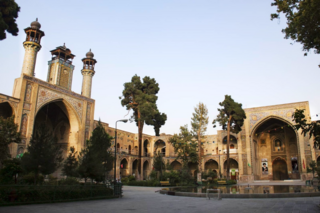Others
- Emami Limited, an Indian company
Emami Islamic Iranian Surname referring to twelver 'Imamah Shia Doctrine
Non-Iranians:
Jaʽfar, meaning in Arabic ”stream/rivulet/creek," is a masculine name of Arabic origin, common among Muslims especially in Iran.
Fadayan-e Islam is a Shia fundamentalist group in Iran with a strong activist political and terrorist orientation. The group was founded in 1946, and registered as a political party in 1989. It was founded by a theology student, Navvab Safavi. Safavi sought to purify Islam in Iran by ridding it of 'corrupting individuals' by means of carefully planned assassinations of certain leading intellectual and political figures.

Mohammad Emami-Kashani was an Iranian politician who was a member of the Assembly of Experts of the Islamic Republic of Iran. He was the Interim Friday Prayer Leader of Tehran. He was also the head of Shahid Motahari University, Tehran.

Grand Ayatollah Mohammad-Reza Golpaygani was an Iranian Shia and marja' scholar. He was born in 1899 in Gogad village near the city of Golpaygan, Iran. He was taught preliminary studies by his father, Mohammad Bagher. At the age of 9, his father died and he later on moved to Golpaygan to continue his studies. He was one of the highest-ranking Shia clergies to participate in the Iranian Revolution, and a one-time serious contender to succeed Ruhollah Khomeini in the 1989 Iranian Supreme Leader election. However, his candidacy was voted down by the Assembly of Experts, in favor of the eventual successor, Ali Khamenei.
Shahidi is a common surname in Iran, Afghanistan and Tajikistan. Like the given name Shahid, it is a Muslim theophoric name, from Aš-Šāhid (الشهيد), one of the 99 names of God in the Qur'an. It is derived from šāhid شاهد, the word for "witness" or "martyr".
Tabatabaei is a surname denoting descent from someone called Tabataba, in particular Ismail bin Ibrahim al-Ghamr , a great-grandson of Ali, the fourth and last of the Rightly Guided Caliphs. It is one of many families of Sayyid Shia Muslims, predominant in Iran, but also in Iraq, Lebanon, Kuwait and Pakistan.
Mousavi is a surname. It is also spelled Moosavi, Moussaoui, Moussavi and Moussawi. The word is an adjective in Arabic which means descendants of Musa. Notable people with the name include:
Mohammad-Taqi, also spelled as Muhammad Taqi or Mohammad Taghi is a common name among Muslims, specially Shia Muslims. It may refer to the following:
Ja'fari is a surname commonly associated with descendants of Ja'far al-Sadiq, an important Muslim scholar and the 6th Shia Imam. In South Asia, Persia and the Levant, those of this genealogy, also often take the honorific title of Sayyid. Descendants of Ja'far al-Sadiq can most commonly be found amongst the Shi'i of Iraq, Iran and the Indian subcontinent. Some Sunni Muslims also associate with the surname Ja’fari.
Sadegh, or accented Sādegh, is an Iranian name and variant of Sadeq.
Mohammad Mousavi may refer to:
Mohammad Ansari or Mohammed Ansari may refer to:
The following lists events that happened during 1961 in the Imperial State of Iran.
Pishgaman Cycling Team is an Iranian UCI Continental cycling team established in 2014.
Muhammad Sadiq, or other spelling variations, may refer to:

Sayyid Hassan Emami was an Iranian Shia cleric and royalist politician. He worked as a judge in the Ministry of Justice and taught law at the University of Tehran.

Shahid Motahari University was built in 1879 by Mirza Hosein Sepahsalar. The university is located in Baharestan square in Tehran, Iran.
Sadeq is an Arab and Iranian given name and surname which is most common in Iran, Pakistan, and Arab countries. Sadegh is the Iranian variant. Other variants include Sadiq. It is the adjective form of the root word [صدق] which means truthfulness, so it means truthful.